Yesterday I wrote a guide to filtering beer commercially and at home, with some brief details on the more generally favored models. Today, I want to go into more details for those of you who may be considering giving this a try for yourselves. This is a home brew filter comparison between the cartridge filter and a compact plate filter.
Please note that some reviewers will tell you that plate filters are only for wine – I have found plate filters to be excellent for beer, provided the beer is not carbonated.
Using both versions is best done from the outlet of one Cornelius keg to the outlet of the second, so as to avoid the beer dropping from the inlet to the base of the keg. The second keg should not be pressurized.
Cartridge Filter for Homebrew
There are many variations on a basic principle when it comes to cartridge filters for the home brewer. They all look similar, but there are significant differences in build quality, making it hard to know how well one will work before tried out. If you are going to buy one, be sure it has positive buyer reviews – you can get a reliable cartridge filter from Adventures in Homebrewing (or check out my suppliers by country if you live outside the USA).
This filter uses CO2 pressure to push the beer from the first keg, through the filter membrane and into the second keg. You will most likely be using a 1 micron grade filter or even lower, so you want to push the beer through at minimum pressure to avoid forcing the sediment through.
If you have a decent model that’s been put together properly and you are careful with your filtration, you should be able to successfully filter a batch of over 40 liters from a single cartridge – although the cartridges are nearly impossible to wash and re-use without industrial grade cleaners.
Pros:
- Does not require power
- Simple and robust design (when made by a reliable manufacturer)
- Low initial cost
- Works reasonably well (when made by a reliable manufacturer)
Cons:
- Does require CO2 to push beer through
- Requires at least two empty kegs to use
- Cartridges can get expensive if purchased individually
- Fiddly to disassemble and clean
I love it for: Getting the job done without costing an arm and a leg.
I hate it for: Not being able to handle more a single batch for each cartridge (without pro-level cleaning requirements)
Verdict:
If this is your first attempt at filtering home brew, start with one of these. Filtering can be a pain in the backside, so you don’t want to spend hundreds of dollars upfront without being certain that you will continue to make use of the equipment.
And I can’t stress this enough: make sure you check out the supplier before you purchase one. This is one purchase I advise against making on eBay! If you must go through Amazon, check out the user comments. Better yet, if you live in the USA, just buy one from Adventures in Homebrewing for peace of mind.
Plate Filters for Homebrew
These really are intended for wine and are sometimes called ‘jet filters’. Some will tell you that these will not filter beer – but that has not been my experience – I have not tried all types though!
Unlike the cartridge filter, these are pump-operated. You will lock a set of filter papers into the frame and the beer is channeled so as to soak the papers and pass through each in series. They are much cheaper to operate regularly because the disposable filter papers cost less than cartridges.
They tend to be made for higher volumes with a single set of filter papers, although smaller models like the Buon Vino Mini are cheaper (scaled-down for batches of 20-40 liters). Preparation and cleaning time can be a little longer and more involved than using a cartridge filter, but this is worthwhile if you do intend to filter homebrew.
Pros:
- Filter papers are less costly per filtration than cartridges
- Often come with self-priming pumps – no CO2 required
- Can filter in from any vessel (not just a pressurized keg)
- Can handle larger volumes
- Really impressive and cool-looking!
Cons:
- Uses electricity around liquid
- Requires thorough cleaning of all parts
- Can be expensive
I love it for: The self-priming pump that can be used from a secondary fermenter!
I hate it for: The clean-up.
Verdict:
At $180-400 for a filtration system, these are only for home brewers who are serious about filtration. However, if you are serious, you can’t go past these babies. Filter papers are just so much better to deal with than expensive, single-use cartridges.
Take a look here at the Buono Vino Super Jet and Mini Jet (or on my Suppliers page if you live outside of the USA).
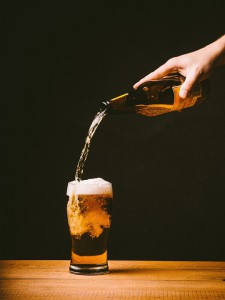
Cheers!
Using filters can be time consuming and tricky, but it can also impress the hell out of your harshest home brew critics.
If you have trouble using one of these or any questions, please leave a comment below!
Read more about filtration here: How to Filter Beer or if you’d like a more hands-off approach, consider an all in one electric beer brewing system
Read next: The Science Behind Beer Koozies: How They Keep Your Beverage Cold!




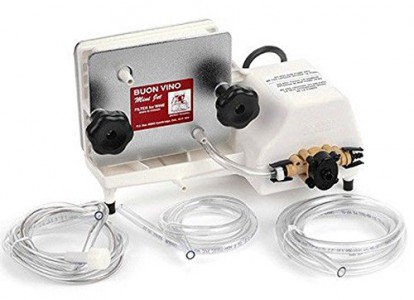
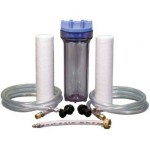
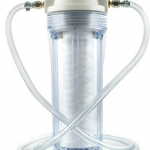
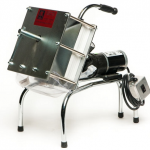
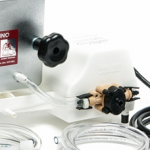
This is really interesting information. I like to brew beer at home from time to time and I never knew that you could get filter equipment like this. Its a fact that although you can pour your home brewed beer very carefully to avoid getting yeast sediment in the glass, but you can never avoid it totally.
Cheers!
Hi Andrew,
It sure can be a challenge – my Dad won’t even stand his bottle back up after his first pour for fear of disturbing the settled yeast.
By the time you are considering filtering though, you are probably already using a keg system. In fact, there is no way I am aware of to bottle-condition your beer AND filter it without losing carbonation – but that would be an almighty invention!
Cheers!